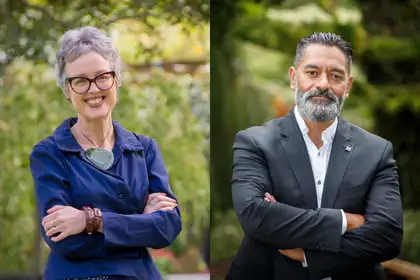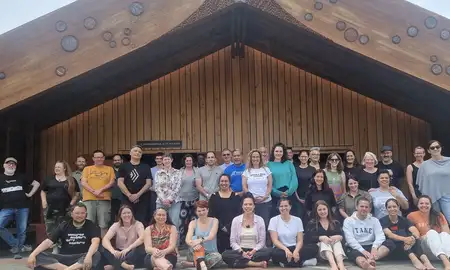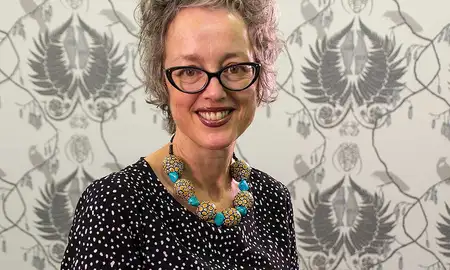
Professor Giselle Byrnes and Professor Meihana Durie.
Former Massey academic Dr Steve Stannard recently published an article on Stuff outlining changes to the Performance Based Research Fund, a major source of research funding for New Zealand universities since 2003. While providing a useful summary of what this fund does and why it exists, Dr Stannard unfortunately described it as ‘an ethnicity-based value system’ and ‘an inward-focused initiative’ for New Zealand. He was particularly concerned about the weighting that Māori research and researchers will attract under the revised criteria for the fund. These new weightings, designed to drive and incentivise different behaviours and outcomes, also apply to Pacific research and researchers.
Far from disenfranchising those academics who are not Māori or Pacific and driving universities away from supporting research activity not linked to things Māori or Pacific, as Dr Stannard suggests, we consider these changes not only positive, but long overdue. We also believe that in righting the wrongs of the past, these changes will place our country and our research institutions on the right side of history.
As the 2019 independent review of the Performance Based Research Fund noted, over the past 15 years this investment has transformed the way research and research support is done in universities, polytechnics and wānanga. The fund has contributed to doubling the number of people making a significant contribution to research and has highlighted previously unrecognised research strengths across our country. However, the review also pointed out that in the future we need to focus our efforts on placing diversity and inclusion at the heart of how we assess research quality. The reviewers argued that we must broaden how we think about research excellence and impact, to ensure our research workforce better reflects society and that the way we assess excellence reflects our shared values.
So, what are these changes that Dr Stannard is so concerned with? They include lifting the funding weighting for the subject area of Māori Knowledge and Development on a threefold basis and increasing the weighting for Pacific research from 1 to 2.5. Additional funding weightings will also be applied to evidence portfolios submitted by staff who identify as Māori by a factor of 2.5 and by those with a Pacific ethnicity by a factor of two. These weightings mean increased funding will follow to those research providers who are growing their capacity and capability in both subject areas and supporting the numbers of eligible Māori and Pacific staff. All of this is in addition to the current settings which will continue to reward the achievements of those who are not Māori or Pacific and those working in a range of other disciplinary areas.
We agree with Dr Stannard that these changes will create stronger incentives for universities and other research providers to prioritise this research. This is a much-needed shift. We can see how these directives to explicitly reward research undertaken by Māori and Pacific researchers and work that uses Māori or Pacific research methods will increase the number and value of historically under-represented groups. This will work to better resource research that has been undervalued for too long. From our perspective, these are the intended outcomes of the changes.
As leaders of a university that has made a clear public commitment to work towards placing Te Tiriti o Waitangi at the centre of our research and teaching, we consider these changes as both necessary and welcome. At its most fundamental, the principles of Te Tiriti, sometimes cited as partnership, protection, and participation, encourage us all to move beyond equality to address issues of equity. Beyond principles, are the important responsibilities of actioning commitment by way of provisions. One of which is reflected in the adjustment to the current funding system so that Māori researchers and by extension Māori research, are more equitably funded. This extends further to also better recognise Pacific researchers and research.
Addressing equality basically means giving each individual or group of people the same resources or opportunities. On the other hand, tackling equity means recognising that each person has different circumstances and then appropriately allocating resources and opportunities needed to reach an equal outcome. As recent studies have shown, universities and other research providers have long been dominated by non-Māori and non-Pacific researchers and research methods. In order to unleash the potential of this research workforce we need as a sector to address longstanding inequities, a fact emphasised in the Government’s recent Te Ara Paerangi white paper. Moreover, to remain internationally competitive, and to do the right thing for future generations, New Zealand universities, polytechnics and wānanga now have a real opportunity to draw on a much richer diversity of approaches to research and in doing so, bring our collective capacity to help solve the big complex problems of our times.
Finally, explicitly valuing Māori and Pacific researchers and research methods will not take us down some sort of inward-looking cul-de-sac as Dr Stannard suggests. On the contrary, both the centrality and criticality of Māori and Pacific research and rewarding a variety of approaches to knowledge creation and research impact will benefit the research coming out of this country and strengthen our ability to be more globally competitive. Put simply, this is not a zero-sum situation, but a ‘win-win’ for Aotearoa New Zealand, our current and future research workforce, and the many communities we exist to serve. The Treaty of Waitangi/Te Tiriti o Waitangi, our nation’s founding document, promised no less.
Professor Giselle Byrnes is Provost at Te Kunenga ki Pūrehuroa Massey University. Professor Meihana Durie is Deputy Vice-Chancellor Māori at Te Kunenga ki Pūrehuroa Massey University.
Related news
Opinion: ChatGPT – what does it mean for academic integrity?
By Professor Giselle Byrnes

Massey University sets new standard for Te Tiriti excellence
This Waitangi Day, Te Kunenga ki Pūrehuroa Massey University is celebrating the launch of an extensive project setting a new standard of excellence in Te Tiriti o Waitangi analysis, practice and implementation initiatives across all areas of the university.

Opinion: View of education ‘dangerously narrow’
The Productivity Commission's New Models of Tertiary Education report, including 77 findings and 49 recommendations, presents a slightly modified suite of proposals to the draft released late last year.
